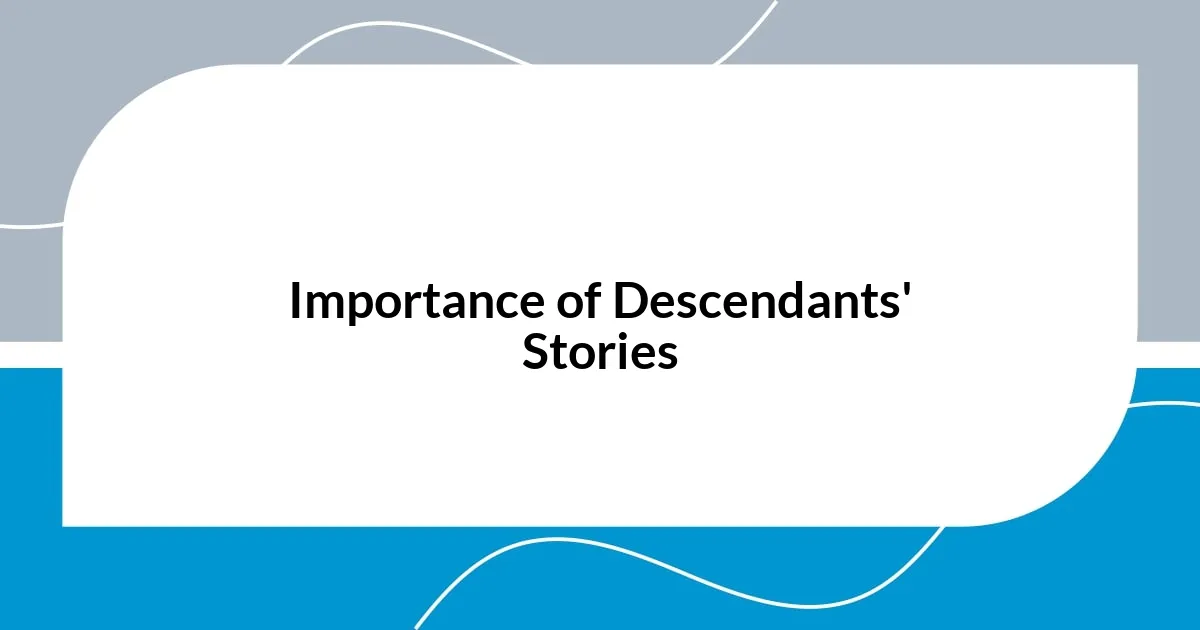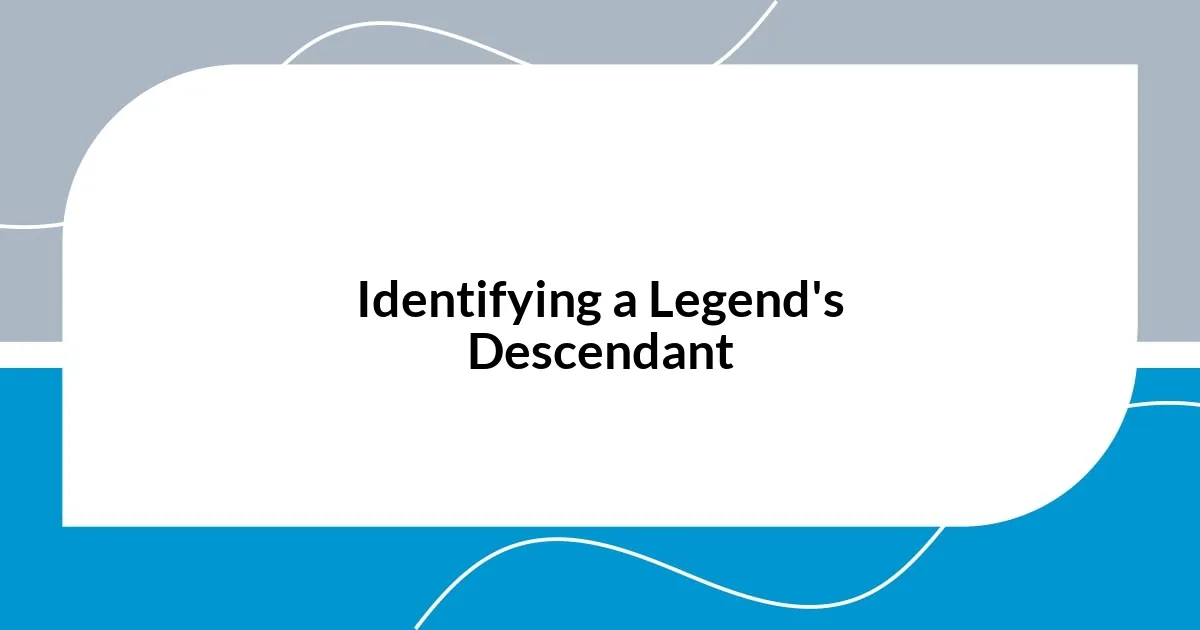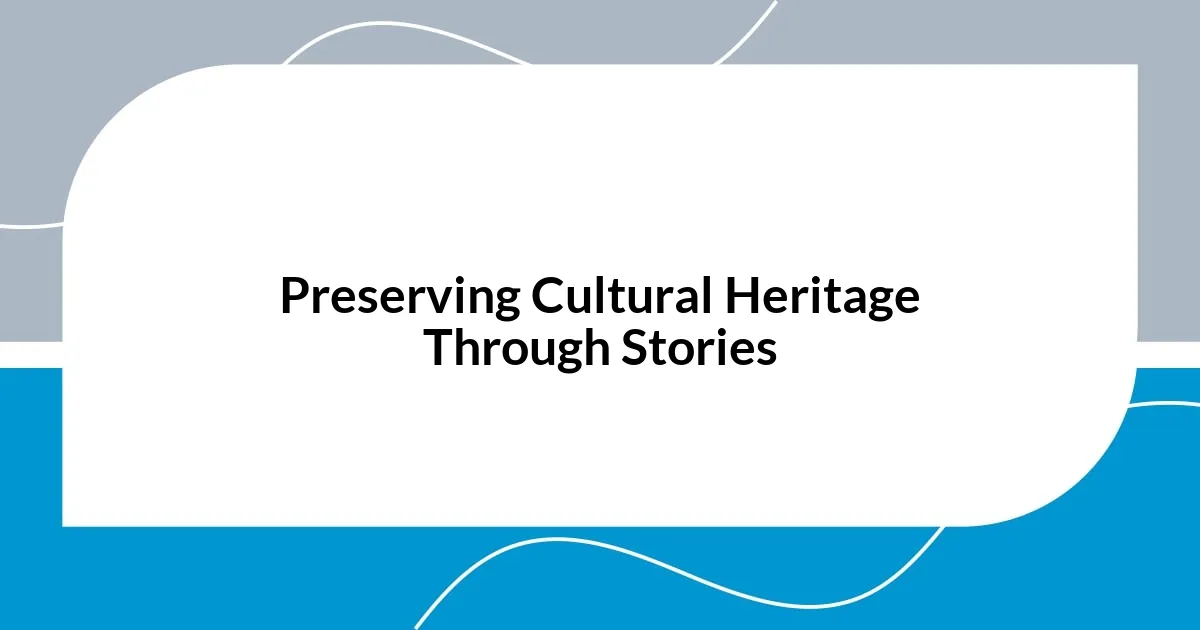Key takeaways:
- Local legends blend history and folklore, shaping community values and individual identities through shared narratives.
- Stories from descendants of local legends provide essential connections to the past, offering guidance and promoting a sense of belonging.
- Researching local legends deepens understanding of cultural heritage and evokes pride, enhancing community ties.
- Personal encounters with descendants reveal the powerful emotional impact of storytelling, fostering connections across generations.

Understanding Local Legends
Local legends often emerge from the rich tapestry of a community’s history and culture, blending fact with folklore. I remember the first time I heard about a legendary figure from my hometown. It was during a cozy gathering at my grandmother’s house, where she passionately recounted tales that seemed larger than life—was I listening to history or a gripping fiction?
These stories resonate for various reasons: they connect us to our roots and offer a sense of belonging. I’ve often wondered how much of what we hear is embellished with every retelling. When I met the descendant of a local legend, I could feel the weight of their family’s narrative—a living connection to the past that sparked my curiosity about how legends evolve through generations.
Legends can serve as mirrors reflecting societal values and fears. For instance, in my town, one particular legend warns against greed, and hearing it from an elder made me ponder its relevance today. Isn’t it fascinating how these stories can shape our morals and influence our decisions? Such reflections highlight why understanding local legends is not merely an exercise in nostalgia; it’s a doorway into the soul of a community.

Importance of Descendants’ Stories
The stories passed down through the descendants of local legends serve as vital links to our past, providing context and emotional depth. I recall a conversation I had with a descendant who shared tales of resilience and perseverance within their family. Listening to their narrative not only deepened my appreciation for the legend but also made me reflect on the challenges we face today—it’s amazing how those connections can influence our own life perspectives.
In many ways, these stories can offer a form of guidance, like a gentle nudge from history. I often find myself drawing parallels between the experiences of legendary figures and the choices I make in my daily life. For instance, when the descendant spoke about their ancestor’s courage, I couldn’t help but apply that idea to moments when I’ve needed to muster strength myself. It’s remarkable how these echoes from the past can shape our present actions.
Lastly, sharing these stories fosters a sense of community and belonging. During gatherings, I’ve witnessed how recounting tales of local legends can spark conversations, often leading to laughter and camaraderie among listeners. It’s through these shared experiences that we create a collective memory, uniting us in appreciation of our shared heritage—making the importance of descendants’ stories undeniable.
| Aspect | Importance |
|---|---|
| Connection to History | Bridges gaps between past and present |
| Guidance | Offers life lessons and reflections |
| Community Building | Fosters togetherness and shared identity |

Researching Local Legends’ Background
Researching the background of local legends can be a captivating journey through time. I remember spending weekends at the town library, combing through old newspapers and journals. The thrill of discovering faded articles that recounted the legend’s original events felt like unearthing hidden treasures. Every piece of information revealed layers of the story that I hadn’t heard before.
To dive deeper into this exploration, here are some approaches I found helpful:
- Historical Context: Understanding the era when the legend originated can reveal much about societal attitudes and beliefs.
- Local Archives: Visiting town archives or historical societies often uncovers unique documentation and firsthand accounts.
- Interviews: Speaking with long-time residents can provide personal insights and anecdotes that books might overlook.
- Folklore Studies: Researching scholarly works on folklore can offer theories on how and why legends transform over time.
Each of these methods not only enriched my understanding but also created a deeper emotional connection to the stories that shaped my community. It’s astonishing how digging into the past can evoke feelings of nostalgia and pride in a legacy that still resonates today.

Identifying a Legend’s Descendant
Identifying a legend’s descendant often requires a bit of intuition and curiosity. I remember the moment I first spotted a unique charm on someone’s necklace—a family crest intertwined with a symbol from a local legend. It sparked my interest, and I couldn’t help but ask. This little interaction opened up a fascinating dialogue that revealed a lineage I hadn’t expected. It made me wonder: how often do we miss these connections, simply because we don’t take the time to ask?
Another approach is paying attention to details; for instance, names and stories that echo through generations. While attending a community event, I overheard someone share an anecdote about their great-grandparent’s exploits. The way they emphasized certain phrases made me realize how deeply rooted these stories are in their identity. Isn’t it intriguing how a single story can reveal so much about a family’s history and connection to local legends?
Finally, I’ve found that passion often shines through in descendants when they discuss their ancestors’ feats. I met someone who became animated while recounting their ancestor’s infamous adventures. Their enthusiasm was palpable, almost contagious. It led me to ask, how do these stories shape their identity today? Engaging with individuals who share this legacy can not only illuminate the past but also enrich our understanding of the present.

Building a Connection With Descendants
Building a connection with descendants isn’t just about asking questions; it’s about listening and sharing stories that bridge generational gaps. I recall a time when I attended a local folklore festival, and I met a descendant who spoke of their ancestor’s heroic deeds with such admiration and pride. I couldn’t help but feel drawn to their narrative, as if I was part of their family’s tapestry. Have you ever experienced a moment where a stranger’s story resonated with you so deeply that it felt personal?
Another memorable encounter was at a local art exhibition, where a descendant displayed pieces inspired by their ancestor’s experiences. I was captivated not just by the artwork but by how they communicated their family’s legacy. It reminded me that our connections often come alive through creative expressions. Doesn’t art have the power to tell stories in ways that words sometimes cannot?
In my journey, I’ve learned that reflecting on shared values can forge powerful bonds. For instance, during a casual conversation over coffee with a legend’s descendant, we discovered shared interests, like community service and preserving history. This common ground fostered an immediate camaraderie, allowing us to explore our roots in a meaningful way. How often do we realize that beneath the surface, we might share more than just a passing interest in a tale?

Sharing Personal Experiences and Insights
In my experience, sharing a personal connection with a legend’s descendant often feels like stepping into a live narrative. I’ll never forget sitting on a park bench with a woman who recounted her great-grandfather’s daring exploits during an era long past. As she spoke, her eyes shone with pride, and I felt the weight of history breathing through her words. I wondered, how powerful is it to carry such stories within us, shaping our identities?
On another occasion, while volunteering for a local historical society, I met a descendant who had dedicated a life to preserving their ancestor’s tales. As we sifted through old letters and artifacts, I felt a profound sense of respect for their commitment. It struck me how storytelling can be a form of legacy—one that binds individuals to their heritage. Have you ever pondered how such dedication could inspire future generations to keep traditions alive?
I’ve also realized that the emotional resonance from these encounters is often unexpected. At a family reunion, I shared a meal with a descendant who had just discovered their lineage linked to a folk hero. Their excitement was infectious, almost like discovering a hidden gem within their family history. In that moment, I thought about the warmth of shared experiences and how they create lasting memories. Isn’t it fascinating how stories, when shared openly, can create a network of connection that transcends time?

Preserving Cultural Heritage Through Stories
Stories serve as vital vessels for preserving cultural heritage. I remember a gathering where an elder shared tales from their childhood that embodied our community’s unique traditions. Each story was a thread connecting us to our past, weaving a vivid picture of our ancestors’ lives. Isn’t it remarkable how a single narrative can encapsulate decades of history in just a few words?
During a walking tour through my hometown, I encountered a plaque commemorating a local legend. A descendant standing nearby shared memories of how their family’s stories had been handed down through generations. Their passion was palpable, igniting my curiosity about the events behind those words. Don’t we all crave that connection to our roots, reminding us of who we are and where we came from?
Reflecting on these experiences, I find that storytelling not only preserves culture but also nurtures community bonds. At a potluck dinner, I was captivated by a friend’s recounting of their family’s emigration journey, filled with challenges and triumphs. Listening to them, I felt an overwhelming appreciation for the resilience of those before us. Have you ever felt a sense of responsibility to carry these stories forward, ensuring that they don’t fade into obscurity?